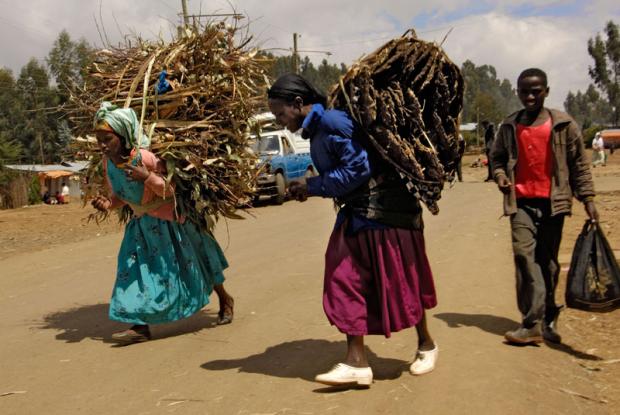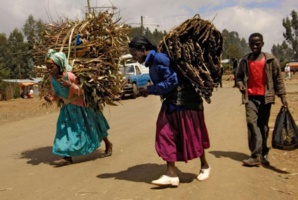An unrelenting advocate of Sustainable Energy for All (SE4ALL), United Nations, Secretary-General Ban Ki-moon, once dramatized the convenience of modern gadgets by holding up his mobile phone in front of his audience saying, “What would we do without them? We are all dependent on phones, light, heating, air-conditioning and refrigeration,” however there are billions who do not even have the bare conveniences such as electricity in their homes, leave alone modern gadgets and appliances.
As per a World Bank estimates, there are more than 1.1 billion people who don’t have access to electricity; 3 billion people are still depend on kerosene, wood and other forms of biomass to heat their house and cook their meals. Although the world is slowly treading along the path of universal access of sustainable energy by 2030, a new World Bank report that is tracking this progress says – it must move a lot faster. Access to renewable energy for all is just one of the U.N’s goals, at the same time it is also vowing to eliminate extreme hunger and poverty by 2030.
The head of the Global Energy Policy Team of the United Nation’s Development programme (UNDP), Martin Krause is of the opinion that access to sustainable energy for all is not a distant dream, in fact it is very much within our reach “but indeed we must move much faster to reach the billions who have been left behind.” He went on to say that a decentralised approach would work best in predominantly rural areas.
“And for the 3.0 billion who cook and heat with wood and dung, new technologies, better awareness and low-cost financing is needed to shift usage away from harmful fuels towards cleaner, and sustainable technologies and fuel sources,” added Krause. Public and private financing is crucial for success, and “For our part, UNDP has just released a new publication, the EnergyPlus Guidelines, which has been prepared to support our country partners in addressing some of these issues.”
With the United Nations SE4All Forum scheduled to conclude on the 21st of May 2015, leaders from different sections of society, be it civil, business and governments, are set to announce new commitments and targets which will ease the pains and fight climate change as well as further our imminence to poverty.
“They will present ways to catalyze finance and investment at the scale required to meet the targets of the UN Sustainable Energy for All (SE4All) initiative on energy access, energy efficiency and renewable energy.”
As per estimates done by the U.N. Industrial Organisation (UNIDO), universal access to renewable energy sources can be attained by investing around $48 billion a year for 20 years, or 960 billion in total.
On its part, the World Bank released a report titled “Progress Toward Sustainable Energy: Global Tracking Framework 2015″. What becomes lucid is that the World Bank is actively monitoring the three goals of the U.N’s SE4All’s initiative: universal access to renewable energy; doubling the energy efficiency of plants, machineries, appliances, gadgets, etc on a global scale; and lastly doubling the share of renewable energies in the global energy mix. All of these goals and targets have to be met by 2030.
The first edition of the report which was released in 2013, focussed on the period between 1990 and 2010. The current edition narrows down its focus between 2010 and 2012. As per the current report, there has been a steady decline of the number of people without access to electricity. Between 2010 and 2012, their number has declined from 1.2 billion to 1.1 billion. In this period although the population grew by 138 million, the number of people with access to electricity grew by 222 million.
Most of these gains were achieved in urban areas in South Asia and in Sub-Saharan Africa. Globally the electrification rate increased from 83% in 2010 to 85% in 2012.
References:
http://www.ipsnews.net/2015/05/u-n-world-bank-set-2030-deadline-for-sustainable-energy-for-all/
As per a World Bank estimates, there are more than 1.1 billion people who don’t have access to electricity; 3 billion people are still depend on kerosene, wood and other forms of biomass to heat their house and cook their meals. Although the world is slowly treading along the path of universal access of sustainable energy by 2030, a new World Bank report that is tracking this progress says – it must move a lot faster. Access to renewable energy for all is just one of the U.N’s goals, at the same time it is also vowing to eliminate extreme hunger and poverty by 2030.
The head of the Global Energy Policy Team of the United Nation’s Development programme (UNDP), Martin Krause is of the opinion that access to sustainable energy for all is not a distant dream, in fact it is very much within our reach “but indeed we must move much faster to reach the billions who have been left behind.” He went on to say that a decentralised approach would work best in predominantly rural areas.
“And for the 3.0 billion who cook and heat with wood and dung, new technologies, better awareness and low-cost financing is needed to shift usage away from harmful fuels towards cleaner, and sustainable technologies and fuel sources,” added Krause. Public and private financing is crucial for success, and “For our part, UNDP has just released a new publication, the EnergyPlus Guidelines, which has been prepared to support our country partners in addressing some of these issues.”
With the United Nations SE4All Forum scheduled to conclude on the 21st of May 2015, leaders from different sections of society, be it civil, business and governments, are set to announce new commitments and targets which will ease the pains and fight climate change as well as further our imminence to poverty.
“They will present ways to catalyze finance and investment at the scale required to meet the targets of the UN Sustainable Energy for All (SE4All) initiative on energy access, energy efficiency and renewable energy.”
As per estimates done by the U.N. Industrial Organisation (UNIDO), universal access to renewable energy sources can be attained by investing around $48 billion a year for 20 years, or 960 billion in total.
On its part, the World Bank released a report titled “Progress Toward Sustainable Energy: Global Tracking Framework 2015″. What becomes lucid is that the World Bank is actively monitoring the three goals of the U.N’s SE4All’s initiative: universal access to renewable energy; doubling the energy efficiency of plants, machineries, appliances, gadgets, etc on a global scale; and lastly doubling the share of renewable energies in the global energy mix. All of these goals and targets have to be met by 2030.
The first edition of the report which was released in 2013, focussed on the period between 1990 and 2010. The current edition narrows down its focus between 2010 and 2012. As per the current report, there has been a steady decline of the number of people without access to electricity. Between 2010 and 2012, their number has declined from 1.2 billion to 1.1 billion. In this period although the population grew by 138 million, the number of people with access to electricity grew by 222 million.
Most of these gains were achieved in urban areas in South Asia and in Sub-Saharan Africa. Globally the electrification rate increased from 83% in 2010 to 85% in 2012.
References:
http://www.ipsnews.net/2015/05/u-n-world-bank-set-2030-deadline-for-sustainable-energy-for-all/


 The United Nations and the World Bank set the deadline for Universal Access to Renewable Energy to 2030.
The United Nations and the World Bank set the deadline for Universal Access to Renewable Energy to 2030.





 Companies
Companies